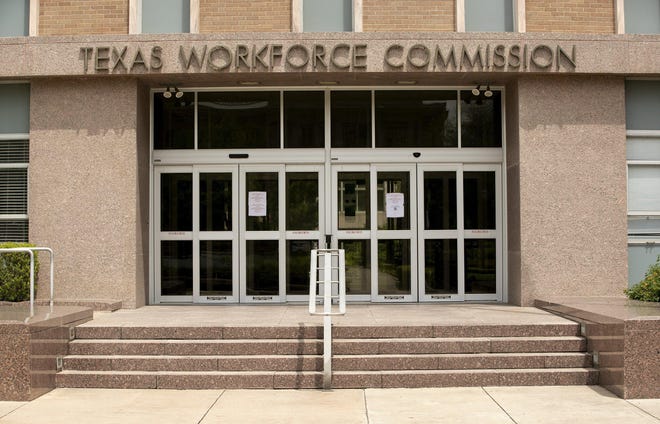Unemployed Texans still seek millions in pandemic jobless aid
[ad_1]
The coronavirus pandemic may be easing, but many Texans who have lost their jobs as a result are still fighting for millions of dollars in unemployment benefits that they claim have been blocked by bureaucratic clumsiness and political maneuvers by leaders.
Texas RioGrande Legal Aid recently filed an official motion – a potential precursor to litigation – with the Texas Workforce Commission asking it to correct “systemic issues” that the legal aid group says lead to “repeated unemployment failures (since the beginning of the pandemic) in the manner prescribed by state and federal law. “
In addition, two groups of Texans organized through Facebook – and about 31,000 combined – have filed a lawsuit in an attempt to reverse a decision by Governor Greg Abbott to stop the state from participating in expanded federal aid programs . including pandemic-related assistance for the self-employed, such as gig workers, and a $ 300 per week surcharge.
More:The state wants to recoup millions, he says, it paid too much to unemployed Texans
Abbott’s decision ended the federal programs in Texas on June 26, about 10 weeks before they expire on September 6.
Each Texan, a liberal advocacy group not involved in the lawsuit, has estimated that approximately 1.3 million Texas residents would have received some pandemic-related federal benefits over the next 10 weeks if the programs had expired on schedule. Put the amount of aid lost in the early exit at a total of $ 7.3 billion.
More:Economic activity in Austin is quickly recovering as the pandemic subsides
The move to halt the programs came after industry groups urged Abbott to do so, saying many companies in the state were unable to find enough people to fill positions while the improved unemployment benefits were in place would stay. More than 20 other Republican-led states are also ending benefits prematurely.
“The Texas economy is booming and employers are hiring in communities across the state,” Abbott said in a written statement when he announced his decision.
But the unemployed who joined the recent lawsuit claim that it is not.
“This is a slap in the face for people in trouble,” said Mateo Garcia, a 52-year-old former law enforcement officer who made a living primarily as an independent driver service contractor in Corpus Christi before the pandemic. “The only thing available now is low-end jobs.”
Garcia said continuing federal programs through Sept. 6 would cost the state nothing – because they are paid for in federal funds – while also giving “the economy more time to heal” and more time for trade to rebound, as well as better-paying opportunities to open above.
Last Friday, a Travis County district judge denied the workers’ request for an injunction preventing Abbott’s decision from being effective during the trial.
Garcia and others involved in the lawsuit said they will move it forward. The groups are planning a rally outside the Travis County Courthouse Thursday at 11 a.m. to protest Abbott’s decision and the judge’s decision on their motion for a restraining order.
Meanwhile, Texas officials said RioGrande Legal Aid – who recently petitioned the Texas Workforce Commission to fix their “repeated failures” last year in order to promptly and correctly process jobless claims – it was unclear how many people might be owed benefits that they are never entitled to receive.
More:Factory production in Texas is accelerating despite rising labor and material costs
Texas RioGrande provides free legal services to people who cannot afford to pay for them.
“We want (the commission) to do the best we can to repair the massive economic and psychological damage they have done to people over the course of the pandemic,” said Dave Mauch, an attorney for the organization.
But Mauch said the clutter in the staff committee made the scale of the problem difficult to quantify. Texas RioGrande tried to help hundreds of clients navigate the agency’s bureaucracy over the past year, he said, but many others across the state likely gave up or were unfairly turned down.
“The problem is that this system is so broken from start to finish,” he said. “You may see tens of millions of dollars – possibly more – in benefits that people have been wrongly denied.”
In a letter to the Personnel Commission, the Legal Aid Group identified a number of barriers to benefit seekers that have been typical of the Agency’s operations since the beginning of last year, when the pandemic first sparked widespread economic disruption and led to a large number of new entrants – Texans work.
Some of the issues have been widely publicized, such as the Personnel Commission telephone system, which Texas RioGrande described as still “largely inoperative” 15 months after the pandemic began, making it nearly “impossible to reach TWC representatives by phone. “
Others include the lack of timely appeal hearings, with Texas telling RioGrande that many people received little to no information about the reasons for their rejection and then had to wait six months or more to try to overturn the decisions.
In addition, the Commission’s practice of recovering allegedly overpaid payments to some beneficiaries is illegal, the legal aid group said, as the agency routinely fails to provide information about the finding or the process of applying for a waiver.
“If we can’t reach an agreement (that will fix the issues), we intend to litigate to protect our customers’ rights under the law,” Texas told RioGrande in the letter to the commission.
A commission spokesman said she received the letter but declined to comment.
Since March 2020, when the pandemic first rocked the economy, the Texas Workforce Commission has processed more than 8.6 million claims for unemployment benefits and disbursed over $ 52.9 billion in state and federal funds, according to the agency.
In 2019, it paid out around $ 2.1 billion in total in unemployment benefits, which is only about 4% of the amount paid out during the pandemic.
[ad_2]


